Living in Idaho, it’s important to be aware of what spiders are lurking nearby or even inside your home. Though most species of spider here are harmless, some can be dangerous.
Are you curious about spiders that call Idaho home? Let’s discover what kinds of spiders you may find.
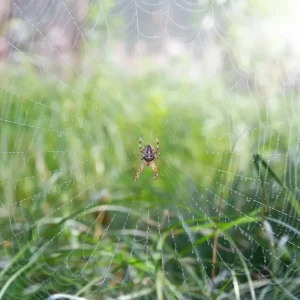 Idaho’s native Grass Spiders, also known as Funnel spiders, are a common sight. They average about a half inch in length, they weave flat webs with funnel-like shapes at one end where they hide while waiting for their food to arrive. This species of spider got its name from the typical placement of these webs between tall grass and other vegetation.
Idaho’s native Grass Spiders, also known as Funnel spiders, are a common sight. They average about a half inch in length, they weave flat webs with funnel-like shapes at one end where they hide while waiting for their food to arrive. This species of spider got its name from the typical placement of these webs between tall grass and other vegetation.
From soft brown to intense gray, these spiders can differ in color with stripes on their bellies and legs. Preying upon flies, moths, beetles and grasshoppers which they trap in their webs; unlike the orb-weavers who construct intricate traps, these spiders trust vibrations from prey that are tangled up within the webbing.
Grass spiders are not usually aggressive, and will only bite if threatened or provoked. If you feel uncomfortable seeing one in your garden or yard, the best way to rid yourself of them is to eliminate their webs and habitats instead of resorting to insecticides which could be damaging for other beneficial insects present on your property. Aside from this, regularly trimming tall grasses as well as keeping debris away from your home can help minimize the number of spiders around it.
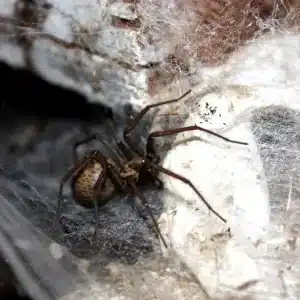 The Hobo spider can be found in many areas across the state of Idaho. They tend to stick to warm and dark places like wood piles, sheds, basements, and other similar spots. These spiders have a unique appearance with tan or brown markings that cover their backs.
The Hobo spider can be found in many areas across the state of Idaho. They tend to stick to warm and dark places like wood piles, sheds, basements, and other similar spots. These spiders have a unique appearance with tan or brown markings that cover their backs.
Hobo spiders are potentially dangerous as they can bite humans and animals when they feel threatened. The venom from their bites is not usually considered lethal but can cause swelling, pain, and other uncomfortable symptoms.
If you find Hobo spiders in your home, you will want to remove them right away as they are capable of reproducing quickly. You may want to consider reaching out to a professional pest control company. They can thoroughly inspect your property and determine the best course of action.
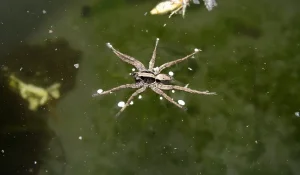 Fishing spiders are found throughout the majority of Idaho. You will usually find them near bodies of water. These spiders are mainly active at night and during the day will hide under rocks or logs close to a body of water. They use their long legs to stride across the surface of the water and snatch up prey such as small fish, frogs, and insects.
Fishing spiders are found throughout the majority of Idaho. You will usually find them near bodies of water. These spiders are mainly active at night and during the day will hide under rocks or logs close to a body of water. They use their long legs to stride across the surface of the water and snatch up prey such as small fish, frogs, and insects.
Fishing spiders can range in size from a quarter inch to nearly an inch long. Their coloring varies from a dark brown to light tan with yellowish markings.
Fishing spiders are generally harmless, yet it is important to take steps to remove them from your home or yard if you encounter one. Bites can occur when they feel threatened, so make sure you wear protective clothing and use a vacuum cleaner or dustpan to remove them from your home.
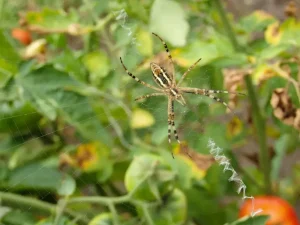 Garden spiders are a common spider found in Idaho. They have long, thin legs and bodies that range in color from yellow to brown. These spiders can often be seen creating their webs around plants or hunting near flowers and fruit trees looking for food.
Garden spiders are a common spider found in Idaho. They have long, thin legs and bodies that range in color from yellow to brown. These spiders can often be seen creating their webs around plants or hunting near flowers and fruit trees looking for food.
Garden spiders feed on insects, such as aphids, flies, mosquitoes, and other small bugs. Spiders are often seen as beneficial in the garden because they help reduce bug populations naturally. As spiders become more active during warmer months, homeowners may find them in their yards and garden areas more frequently.
Although spiders can be beneficial, you may want to keep them out of your garden. To discourage spiders from entering a garden, keep the area free of piles of leaves and other plant matter. Spiders like to hide in these areas, so keeping the garden neat and tidy can help reduce spider populations. Spiders are attracted to light, so you may want to turn off outdoor lights at night or keep them far away from the garden. Natural predators like frogs and birds may also help reduce spiders in a garden area.
Garden spiders are not considered a danger to humans or pets, as they are typically small and harmless. However, if you have an infestation of spiders that is too large to manage, professional pest control services may be needed to help get rid of them.
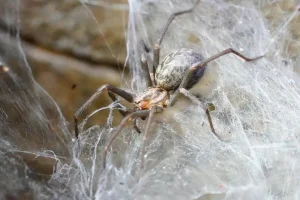 Barn Funnel Weaver spiders are native to Idaho and can be found in many areas. They get their name from the funnel-shaped web they build, which is usually located between sticks or stones on the ground. These spiders are fairly small and have a brown body and yellow abdomen.
Barn Funnel Weaver spiders are native to Idaho and can be found in many areas. They get their name from the funnel-shaped web they build, which is usually located between sticks or stones on the ground. These spiders are fairly small and have a brown body and yellow abdomen.Barn Funnel Weaver spiders are usually found living in fields or grassy areas, as they prefer to make their webs in grassy areas. They tend to be most active at night, feeding on small insects like flies and mosquitoes.
It’s important to be aware of Barn Funnel Weaver spiders if you live in Idaho, as their bites can be harmful. While they rarely bite, if you do feel a sharp pain or find an itchy rash on your skin it’s best to seek medical attention immediately. It’s important to keep your home free of spiders and their webs by regularly inspecting the exterior for signs of spiders and removing any webs you see. If you do come across Barn Funnel Weaver spiders in your home, you may want to contact a pest control specialist.
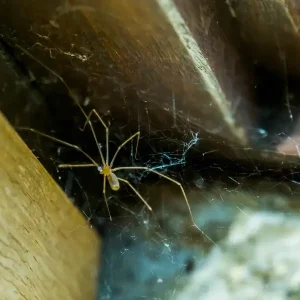 Cellar spiders are a common spider found in Idaho. They are about two to three millimeters long and have thin legs that radiate out from the center of their bodies. They’re typically light brown or gray with stripes on their abdomen.
Cellar spiders are a common spider found in Idaho. They are about two to three millimeters long and have thin legs that radiate out from the center of their bodies. They’re typically light brown or gray with stripes on their abdomen.
These spiders live in cool, damp places such as basements and cellars, hence their name. They spin webs between basement ceilings and walls so they can catch flying insects like mosquitoes and moths for food. Cellar spiders become active during early spring when temperatures begin to rise and remain active until frost sets in near late fall.
If you find cellar spiders around your home, there is no need to worry about them being dangerous or intrusive. Cellar spiders generally avoid people and are harmless. In fact, they are beneficial to have around as they help control insect populations.
If you’re concerned about cellar spiders in your home, the best thing you can do is practice good housekeeping habits. You should also keep windows shut tight to prevent spiders from entering your home in the first place.
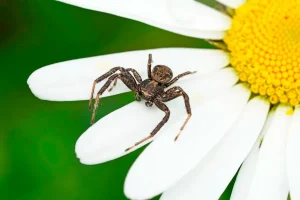 If you’re in Idaho, it’s likely that you’ve encountered a crab spider before. These interesting looking spiders are common sights around the state! They have oval-shaped bodies and vary in color, but are usually various shades of brown. Their legs are very long compared to their body size, which helps them move quickly and find prey easier.
If you’re in Idaho, it’s likely that you’ve encountered a crab spider before. These interesting looking spiders are common sights around the state! They have oval-shaped bodies and vary in color, but are usually various shades of brown. Their legs are very long compared to their body size, which helps them move quickly and find prey easier.
These spiders lurk in shady areas such as beneath logs, stones and foliage. They can also be found hiding inside plants or blooms. Once a victim wanders into their vicinity, these arachnids quickly dart forward with their lengthy legs to capture them for dinner.
Crab spiders mainly feed on small insects such as gnats, flies, and bees. They can also eat other spiders if they are hungry enough.
If you spot a crab spider in your home or garden, you may want to just leave it alone. You may consider utilizing natural repellents, such as orange peels or cayenne pepper, to deter them from the areas you are seeing them in. If they become a nuisance, it’s best to contact a pest control specialist.
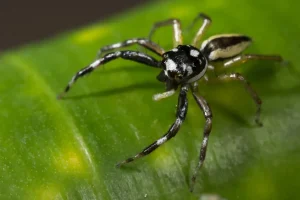 The zebra jumping spider is a common species found in Idaho. These tiny creatures are known for their striking black and white striped patterns and their exceptional jumping abilities.
The zebra jumping spider is a common species found in Idaho. These tiny creatures are known for their striking black and white striped patterns and their exceptional jumping abilities.These tiny spiders have short, velvety fur and measure between 5 to 10 mm in length. What sets them apart from other spiders is their extraordinary vision which allows them to identify prey from afar and jump to attack.
Zebra jumping spiders are adept hunters during the day. They can be found in open areas that receive sunlight where they feed on a variety of insects like flies, moths, and even their own kind. Despite their small size these creatures have remarkable agility which they use to expertly close in on unsuspecting prey.
Zebra jumping spiders can be found in grasslands, forests, and residential areas. They are most commonly found on plants, where they hunt for prey or seek shelter.
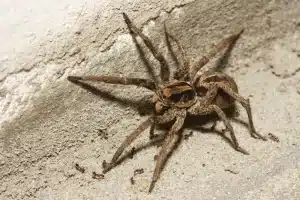 Wolf spiders can range in size from small to quite large, with some measuring over two inches in leg span. They have two large, forward-facing eyes and six smaller eyes arranged in a semicircle on the top of their head. Their coloring varies, but they often have brown or grayish bodies with distinct markings or patterns on their backs.
Wolf spiders can range in size from small to quite large, with some measuring over two inches in leg span. They have two large, forward-facing eyes and six smaller eyes arranged in a semicircle on the top of their head. Their coloring varies, but they often have brown or grayish bodies with distinct markings or patterns on their backs.
Wolf spiders are typically found in open areas such as fields, meadows, and along forest edges. They prefer dry, warm environments and are often found under rocks, logs, or other debris. They are also sometimes found indoors, particularly in basements or crawl spaces.
Wolf spiders do not use webs to catch their prey, they are hunters. They stalk and ambush their prey, chasing after insects such as crickets, grasshoppers, and other spiders. They are active hunters, hunting night and day. Unlike many other spiders, wolf spiders are not typically aggressive towards humans, and will usually only bite if provoked.
If you come across a wolf spider, it’s important to remain calm and avoid disturbing the spider. While these spiders are not generally dangerous to humans, their bites can be painful and cause swelling or redness.In the event of a bite, be sure to thoroughly wash the wound with soap and water as well as use a cold compress to minimize inflammation. If any serious symptoms such as trouble breathing arise, seek medical help right away.
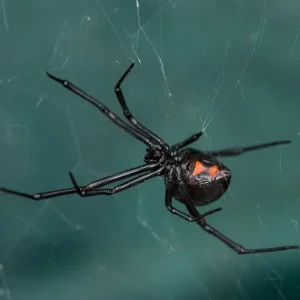 Western black widows can be identified by their glossy black color with a red hourglass shape on their abdomens. They are shy spiders, often hiding in dark crevices or corners. At night, they come out to hunt for prey such as insects and other spiders.
Western black widows can be identified by their glossy black color with a red hourglass shape on their abdomens. They are shy spiders, often hiding in dark crevices or corners. At night, they come out to hunt for prey such as insects and other spiders.
They live in dark, sheltered areas such as under rocks and logs, basements and garages. They can also be found around outdoor furniture or under decks.
If you happen to spot a Western black widow in your home, do not panic! These spiders prefer to be left alone and would rather flee than stay and fight. You should contact a pest control specialist right away though.
If you get bitten by a Western black widow, seek medical attention right away. The venom of this spider can be dangerous and cause serious symptoms, including chest pain, nausea, fever and chills.
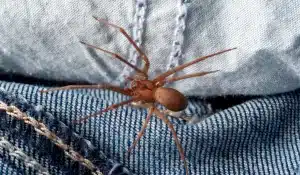 The spiders can be found in or near dark and warm places like wood piles, sheds, garages and basements. They tend to hide during the day and come out at night to hunt for prey. Brown recluse spiders are bold jumpers that feed on small insects and other spiders.
The spiders can be found in or near dark and warm places like wood piles, sheds, garages and basements. They tend to hide during the day and come out at night to hunt for prey. Brown recluse spiders are bold jumpers that feed on small insects and other spiders.
If you’ve seen a brown recluse spider in your home, it’s important to take the necessary steps to control their population. Start by inspecting the interior and exterior of your home to identify any potential hiding or nesting spots. You should seal up any cracks and crevices in your home to prevent spiders from entering. You will also want to contact a pest control specialist, they perform an inspection and help get rid of any spiders living in your home.
If a Brown recluse bites you , it’s important to seek medical attention immediately. Symptoms of a bite can include pain, itching, and redness of the area surrounding the bite. In some cases, people may also experience nausea and vomiting.

- To keep spiders out of your home, it’s important to seal any cracks or gaps around doors and windows.
- Keep your home clean and free of clutter, as spiders like to hide in dark, cluttered places.
- Vacuum and dust on a regular basis to remove any spiders or spider webs that may have made their way into your home.
- Keep your yard clean and free of debris. Move wood piles away from your home, and rake up your leaves regularly.
- If you are still concerned about spiders in your home, contact a professional pest control company for assistance.
Whether you’ve lived in the beautiful state of Idaho your whole life or just moved here, it’s likely that you’ll spot a spider at some point. By learning about the types of spiders typically found around these parts, you can easily tell which are harmless and which to watch out for. To keep yourself and your loved ones safe as well as drive away these undesirable intruders from where they don’t belong-your home-don’t wait any longer to call an expert pest control service!
